The Fountain by Darren Aronofsky is by far the most powerful symbolic movie I have seen in the last few years. Watching it is always like being transported into another reality; the music, the powerful images and the three interwoven stories that are presented are just hypnotizing. The core story is that of Tommy Creo, a doctor who is losing his wife Izzi to cancer. Instead of sharing their last moments together he focuses on finding a cure for her and embarks on a hopeless, quixotic fight with her disease. After she inevitably dies he keeps on resuscitating her for a prolonged, painful stretch of time, refusing to let go and accept that she is no longer with him. She, on the other hand, accepted her situation with a lot of grace and dignity. Up to her death, her heart and mind had been occupied with the book she had started writing and wanted her husband to finish after her death. She was writing a story called The Fountain about a 16th century Spanish Queen Isabela, whose country suffered under the bondage of the Grand Inquisitor, who relished in torturing people and wanted to destroy the Queen and take over her kingdom, not unlike the tumour wreaking havoc with Izzi’s body. She sends a conquistador Tomás, her consort, to the Mayan territory in Central America to find the Tree of Life and deliver her and Spain from bondage. The last futuristic story is about an astronaut Tom, who travels in a giant spaceship looking like a bubble, with the Tree of Life on deck, towards the golden nebula of Xibalba (the Mayan underworld, literally ‘the place of fear’). Hugh Jackman and Rachel Weisz play the two main characters in each story. The stories echo and converse with each other; the mythical motives appear and reappear weaving a closely interlinked pattern of human fate consisting in being cast out of Paradise into the world in which we all need to face pain, separation, loss, death and suffering. I also see it as a movie on the healing and transcending power of love. It is the love for his wife that compels Tommy/ Tomás /Tom to keep reincarnating throughout eternity always looking for his divine Other, and finally enables him to let go of fear, and reach release and Enlightenment in the movie’s final scene.
I would not like to go into too much detail about each storyline in case there is anyone reading it who has not seen the film. I would like to focus instead on the symbolic richness of the story. The main symbols of the movie seem to be the Fountain, the Tree of Life, the Book, the Ring (wedding ring in the 21-century story and engagement ring in the conquistador story, and most probably the breathtaking golden ring round the nebula in the futuristic story). The main symbol is undoubtedly that of the Fountain (or Source), which emerges from the Tree of Life. In the words of Cirlot:
In the image of the terrestrial Paradise, four rivers are shown emerging from the centre, that is, from the foot of the Tree of Life itself, to branch out in the four directions of the Cardinal Points. (The Dictionary of Symbols)
From the Source the seeds of creation are sown upon the material plane. The Source is the symbolic matrix which fecundates the world as we know it. The Fountain is the life force itself. In the movie, the main characters discover the true source of immortality. Carl Jung himself wrote a lot about the symbolism of fountains. He likened the Fountain to the Soul as the source of spiritual life and energy.
Hieronymus Bosch, Garden of Earthly Delight, Fountain (detail)
It is fascinating that, as life was leaving her body and cancer was spreading, Izzy found her inner Fountain of fecundity and creativity, and wrote a beautiful book. She seemed to have become whole right before she passed away, as this wonderful dialogue from the movie attests:
Izzi: Remember Moses Morales?
Tom Verde: Who?
Izzi: The Mayan guide I told you about.
Tom Verde: From your trip.
Izzi: Yeah. The last night I was with him, he told me about his father, who had died. Well Moses wouldn’t believe it.
Tom Verde: Izzi…
Izzi: [embraces Tom] No, no. Listen, listen. He said that if they dug his father’s body up, it would be gone. They planted a seed over his grave. The seed became a tree. Moses said his father became a part of that tree. He grew into the wood, into the bloom. And when a sparrow ate the tree’s fruit, his father flew with the birds. He said… death was his father’s road to awe. That’s what he called it. The road to awe. Now, I’ve been trying to write the last chapter and I haven’t been able to get that out of my head!
Tom Verde: Why are you telling me this?
Izzi: I’m not afraid any more, Tommy.
Tommy and Izzy spotting Xibalba
Once again Cirlot speaks about the symbol of the Tree most eloquently:
In its most general sense, the symbolism of the tree denotes the life of the cosmos: its consistence, growth, proliferation, generative and regenerative processes. It stands for inexhaustible life, and is therefore equivalent to a symbol of immortality. According to Eliade, the concept of ‘life without death’ stands, ontologically speaking, for ‘absolute reality’ and, consequently, the tree becomes a symbol of this absolute reality, that is, of the centre of the world.
The Tree of Life from the 16th-century part becomes a cosmic tree in the futuristic part of the movie. Tom takes the tree with him from the earth into space; the upward movement signifying him reaching higher understanding and release. In the final scene of the movie the cosmic tree is bathed in the golden light. You might remember there were two trees in the Biblical paradise: one was the Tree of Knowledge of Good and Evil, the other the Tree of Life; the latter being well hidden and almost impossible to find. I love how the film explores this perennial myth of immortality and of the mysterious dualism of Life and Knowledge.
The movie’s cosmic tree
The ring, which keeps appearing in many scenes, is symbolic of both the loving connection between the main characters, of their souls reincarnating throughout the ages, and also of their wholeness and connection with the divine Self that they both finally reach but in different time frames. The doctor loses the ring at one point, which is symbolic of him losing the connection with Izzy his anima (soul). He is too focused on fixing and conquering the problem instead of just being with her and accepting of what is happening. It is interesting that Cirlot would note additionally that the ring should be symbolically related to a link of a chain. He does not elaborate on that remark, but the theme of bondage seems to permeate the movie. We are bound to this earth and to matter like Prometheus chained to the rock of Caucasus. The only transcendence we can hope for is through finding a connection with our inner Fountain. As an aside, I just had an illumination that the elusive symbolism of the ring in Tolkien is closely related to the bondage of our passions (Jung’s inferno of passions), fears, anxieties and all else that is related to the life of the flesh. And finally the Book that Izzi creates is a powerful testimony that out of physical frailty and transience arise infinite achievements of the human spirit.

Support my blog
If you appreciate my writing, consider donating and make my day. Thank you in advance.
$1.00

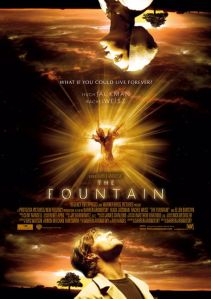
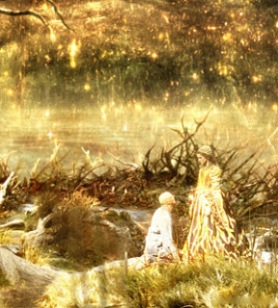

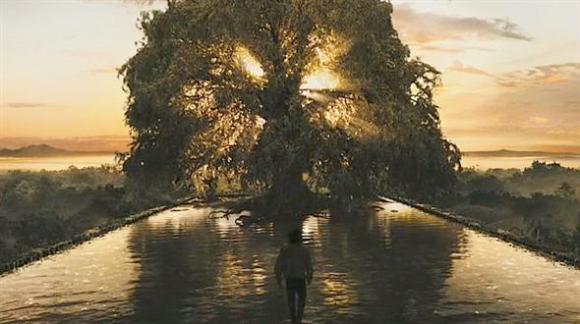

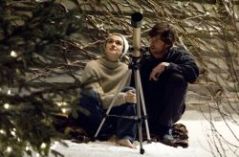
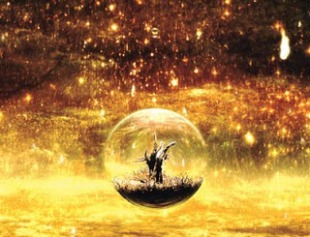






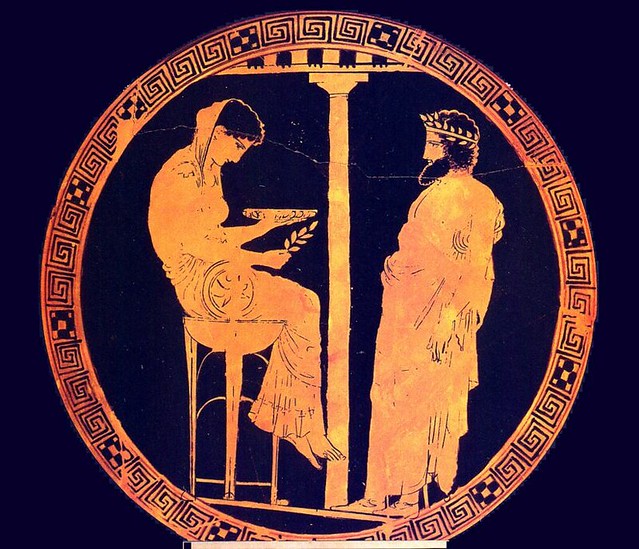




thanks i must see this movie – wonderful enlightening post – namaste
LikeLike
I would be curious to hear your thoughts after you’ve seen it.
LikeLike
sure
LikeLike
Great Images Monika! After your glorious post, I am very eager to see The Fountain. Your enchanting narratives about symbols are so lovely. You would be such a great addition to my dream groups 🙂
love, Linda
LikeLike
You’re so sweet, Linda.
LikeLike
Such a beautiful and outstanding post. I haven’t seen the movie, but I’m certainly going to watch it now. That dialogue you shared from the movie touched me deeply – thank you.
LikeLike
Thank you for the thoughtful comment. I think the movie was quite underrated.
LikeLike
SymbolReader nothing makes me slow waaaay down and take on a meditative attitude like your posts. Need I add I haven’t seen the movie? I know what I’m watching tonight. 😉
LikeLike
Come back and share you thoughts on what you’ve seen. Lovely comment, thanks!
LikeLike
Last night I finally watched The Fountain. This morning, I watched Q. Tarantino’s new movie “Django Unchained. After I finish a post generalizing on the experience of watching such contrasting voices and messages back-to-back, I’d like to take up your offer to comment in specific on The Fountain. Easier said than done–even for a short comment.It would take volumes to say what the Fountain accomplished in 2 hours.
LikeLike
Django also made a huge impact on me, so I am looking forward to your post.
LikeLike
You inspire me to see this movie again. It was good once but, as you say, it is so rich with layers of meaning another pass will be good. The director’s mention of Eliade is cool. Deep contemplative author and teacher. Rich post, thanks!
LikeLike
Thank you, Donna. I believe it was actually Cirlot, the author of the Dictionary of Symbols that I use, who mentioned Eliade. Eliade was also a great inspiration of mine. Thank you very much for reblogging this.
LikeLike
Yes, of course! and oops on the error.
LikeLike
Reblogged this on Blazing Light, Love's Song.
LikeLike
You also interested me to see The Fountain. Thanks for this beautifull story about it.
I am particulary hit by the qoute of death as the road to awe and by moses dead father becoming part of the tree, its bloom en fruits, the sparrow.
I recognise very much the feeding en daily inspiring significance of death in my life. The notion of death always has been very close to me. Already when I was a child. There’s almost not a day that I’m not thinking about it. But not at all in a negative way. The idea of our short existence in the temporary form of a human being (and even in that form constantly transforming) gives me indeed a kind of awe for the greatness of the all we are part of. It also gives me inspiration every day to – try to – experience, to enjoy, to be positive and to give my best. It also gives me rest, perspective and acceptation
It also lead to my personal interpretation of ‘reincarnation’, being a very accidental dynamic clustering of cells, molecules and atoms, which already during my life transforms contiously in other forms (in every breath we inhalate surely some oxygen that was part of e.g. a dinosaur or a day fly, or youre worst enemy, if you have one, or….). So returning to ashes after we die is only a next step in this ungoing reincanation…
So this symbol of moses father becoming the tree, the fruit, the bird, etc I like very much.
Looking forward to your next post!
Mart.
LikeLike
Wow, so almost no one has seen it…
Great comment, as usual. Thanks!
LikeLike
Found me a muse I’m afraid 🙂
http://martsart.wordpress.com/2013/04/19/tree/
SY.
LikeLike
I’m blushing.
LikeLike
Oh, I have seen this movie a few times (both in the theater and at home)!!. I found it thrilling, exciting, powerful. The first viewing was the best for its awe-factor (was really nice on the big screen!), but there’s much enjoyment and that ‘seeing something else’ or ‘something deeper’ with each viewing. A really beautiful, meaningful movie. And a beautiful, meaningful post.
LikeLike
Thank you very much, this really means a lot. I’ve seen it a few times as well. I feel you can always dig deeper with this movie and your understanding is never complete.
So nice of you to reblog it.
LikeLike
Reblogged this on Pisces and commented:
symbolreader has written a fantastic blog post about one of my favorite movies, The Fountain, which was out in theaters back in 2006. Beautiful, richly symbolic, thought-provoking, awe-inspiring, otherworldly at times- this movie is all that. Love, death, transformation, reincarnation, mortality, immortality, enlightenment- this movie has all that. Do see it, if you haven’t yet.
LikeLike
Great review. I watched this movie a year ago without ever knowing the title. It was chuck full of symbolism and layers that I wanted to have another look at later, because I was too busy shielding myself from the person I was watching it with. I dealt with the person, now I can get back to that movie. It is back on my list. Thanks for reminding me. 🙂
LikeLike
You’ve got to watch the movie with the right person now. 🙂
LikeLike
Yes!!!!! ME. 🙂
LikeLike
Thanks for reading my review and commenting. I love your site. I will be back to go over it more thoroughly when I have time.
LikeLike
Reblogged this on The RunningFather Blog.
LikeLike
A truly wonderful piece on a complex movie. You really tie together a lot of the connections that I couldn’t make watching it. Now I should see it again. I’m sure it will make a lot more sense to me.
The part about Moses becoming the tree was a very freaky scene for me. I once had a dream, years ago, around the time I had just moved out west to Oregon. In the dream I was lying down and a tree started to sprout out of my belly. I woke up terrified, but this scene in the movie of transforming into the tree takes on new meanings for me, or at least an occasion to revisit the image and memory of it.
xxx
Debra
LikeLike
Thank you, Debra. I have seen this movie a few times and I’m always mesmerized by it. I do love your dream.
LikeLike
Probably won’t see this comment, but great article- this has been one of my favorite movies since the first time I saw it, and I really enjoyed the commentary here. Good job- finish it!
LikeLike
Hi, thank you. I wonder what you mean by finishing the job.
LikeLike
This is one of my must-watch movies. Absolutely have loved this movie since it first came out. I’m actually writing an essay on death today that I’ll be publishing by the end of the day that is slightly inspired this film. Hence how I found your page.
LikeLiked by 1 person
Thanks for the comment! I loved the poem about the inner light a lot.
LikeLiked by 1 person
Thank you so much! Some day I would like to discuss symbols with you. I use them quite a bit in my writing.
LikeLiked by 1 person
Pingback: The Fountain | Harmonia Philosophica
I read your note after watching fountain near 10 times during 6 years of my life, which is the last time was tonight. It still covers my face with tears from beginning to the end. I should read your note again since English is not my mother tongue as I am Iranian and start reading more on myths…
LikeLiked by 1 person
I have a similar reaction to this movie. I am glad you found something of value in my writing. Thank you!
LikeLike
I could not agree more , I am so pleased to find this review as my contemporaries do not agree and call me a sentimental old fool for loving this movie 🙂 Its more an experience than a movie !
LikeLiked by 1 person
Hi Peter, thank you for finding my review and leaving a heartwarming comment!
Monika
LikeLike